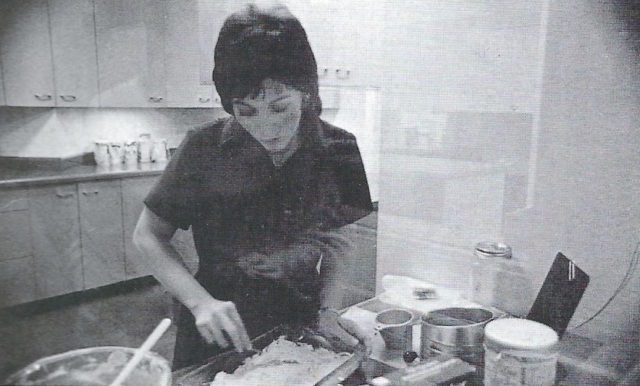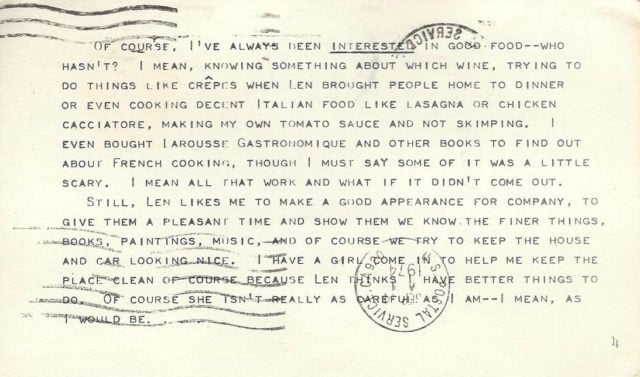Opinion
Martha Rosler Described Women’s Issues of ’75; They’re Still With Us
THE DAILY PIC: At Alden Projects, Rosler's 'postcard-novels' speak of privilege, industrial foods and migrant labor.

THE DAILY PIC: At Alden Projects, Rosler's 'postcard-novels' speak of privilege, industrial foods and migrant labor.

Blake Gopnik

MY DAILY PIC (#1583): In 1974 and 1975, Martha Rosler made three “postcard novels” – more like first-person short-stories, really, that she mailed out in three-by-five-inch installments every week or so. They are fairly well known from the book version she put together in 1978 (today’s Pic is from its cover), but a full set of the more poignant original cards are on view at Alden Projects in New York, one of the most original galleries in the city.
The subjects of Rosler’s tiny novels seem as topical today as when she was writing.
One, called A Budding Gourmet (see image below) is written in the voice of a spoiled, complacent rich woman – a one-per-center before they were called that – who boasts about her knowledge and skills as a gastronome: “The Indians are extremely spiritual. It’s a kind of reverence for the food. The Orientals all have it” and “If I didn’t have a good education, wasn’t well brought up, I might not realize that there were better things, higher things” – meaning crepes and “Ris de Veau des Gourmets.”
Another is the tale of a fast-food worker who first describes the horrors of the food-system she’s working in: cattle living in tiny pens and pumped full of antibiotics; artificial bread-smell added to the bread. Then she talks about the secret steps she and her fellow wage-slaves take to add more flavor to the foods they serve (also, marijuana) and to improve their working conditions.
The final novelette is written entirely in Spanish, from the viewpoint of an illegal immigrant who jumps the border to San Diego, finds work as a maid and then suffers all the standard indignities and terrors of immigrant labor: The father in one family expects her to cook him “Mexican” chili con carne, and then tries to rape her.
It’s wonderful that Rosler managed to dig so deep into the female condition of her moment, in a new medium of her own devising. It’s unbelievable that, 40 years later, we are still dogged by precisely the same issues of privilege, food production and immigrant labor, barely changed in any of their details.
Rosler’s prescience is impressive, but what could be more disappointing, especially for someone from these optimistic United States, than foreseeing a grim future by simply describing your own present.

For a full survey of past Daily Pics visit blakegopnik.com/archive.